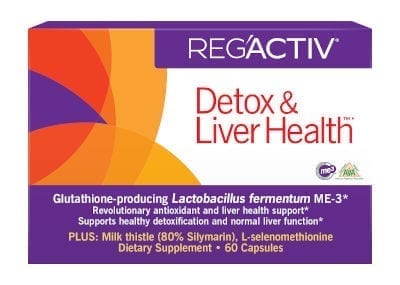
Science Catching Up to a Decade-old Study
by a Pioneer in Probiotic Health
By Ross Pelton, RPh, PhD, CCN
Part 1: Review of Clinical Trials
Studies in animals have verified that intestinal bacteria have a strong influence on bone metabolism.i However, a recent study published in the June 2018 edition of the Journal of Internal Medicine announced that this was “the first time in the world” that a human clinical trial revealed that probiotic bacteria could affect bone metabolism and skeletal health.ii
Science is in a burgeoning era of probiotic research discovering the vital role that the body’s microbiome (the collective microorganisms living in the intestinal tract), play in every aspect of our health. New studies continue to prove that probiotics and their byproducts, postbiotic metabolites affect all of the body’s primary regulatory functions, including bone metabolism.
However, the claim that the above-referenced study is the first human clinical trial reporting that probiotics produce beneficial effects on skeletal health is incorrect.
In 2003, Dr. Iichiroh Ohhira his colleagues had their study, “The Influence of Lactic Acid Bacteria (OM-X) on Bone Structure” published in the Journal of Applied Science substantiating that men and women who consumed Dr. Ohhira’s Probiotics gained substantial increases in bone mineral content and bone density when pre-study values were compared to values at the end of the study.
I now will review and comment on both of these landmark studies:
Study: “Lactobacillus reuteri reduces bone loss in older women with low bone mineral density,” July 2018, Journal of Internal Medicine.
In July 2018 a study titled, “Lactobacillus reuteri reduces bone loss in older women with low bone mineral density” was published in the study participants consisted of 90 relatively healthy elderly women between the ages of 75-80 who all presented with low bone mineral density (BMD). The participants were randomized to receive either the L. reuteri 6475 probiotic or a placebo daily for one year.
Scientists at the University of Gothenburg, Sweden presented the outcome 50 percent can reduce age-related bone loss for elderly women ingesting a specific strain of probiotic bacteria named Lactobacillus reuteri 6475.
At the end of the one-year trial, researchers measured the women’s bone loss in their lower legs with a CT scan and compared it with the measurements that were taken when the study commencement. The women who received the probiotics exhibited 50% less bone loss compared with the women who received a placebo.
Study: Dr. Ohhira’s Probiotics® Increase Bone Density: Clinical Trial, February 2003, “The Influence of Lactic Acid Bacteria (OM-X) on Bone Structure,” Journal of Applied Nutrition.
In 2003, a study titled The Influence of Lactic Acid Bacteria (OM-X) on Bone Structure was published in the Journal of Applied Nutrition.iii In Japan, the probiotic that Dr. Ohhira created is marketed under the brand name OM-X, which stands for Ohhira Mountain Extract. When Essential Formulas began importing OM-X to the United States, they changed the name to Dr. Ohhira’s Probiotics.
The study participants included 157 men & women (aged 20 to 60 years old) took Dr. Ohhira’s Probiotics daily for 24 months. Bone density measurements were taken at two locations, the radial and ulna bones. At the end of this study, the following was reported. Women taking Dr. Ohhira’s Probiotics increased their bone mineral content by 32% and their bone density by 18%. The men taking Dr. Ohhira’s Probiotics achieved an average of 22% increase in their bone mineral content and a 12% increase in their bone density. Results were the same across all age groups.
Comments & Analysis:
COMMENTS ON THE SIGNIFICANCE OF BOTH STUDIES:
In the Swedish study reviewed above, the participants consisted of only elderly women (aged 75-80), and the results showed that the women taking a probiotic experienced a reduction in the rate of bone loss as they aged.
In the study with Dr. Ohhira’s Probiotics, the participants were both male and female ranging in age from 20 to 60 years old, and the outcome revealed that the people who took Dr. Ohhira’s Probiotics gained increases in their bone mineral content and their bone density.
Analysis:
According to statistics from the National Health and Nutrition Examination Survey 2005-2010, approximately 54% of the US adult population ages 50 years, and older have low bone mass or outright osteoporosis. The cost to American taxpayers is enormous because Medicare pays for 80% of the expenses for broken bones that result from osteoporosis.iv Experts are predicting that by 2020 the incidence will grow from 54 million Americans to 64.4 and by 2030, the number is expected to increase to 71.2 million (a 29% increase from 2010).
Osteoporosis-related fractures take an enormous emotional toll and severely compromise the quality of life for millions of people. In addition to hospitalizations and placement in nursing homes, fractures like a broken hip frequently start a downhill slide that results in death.
Part 2: Explanation of How Probiotics Influence Bone Health
The Gut-Bone Connection:
Both of the studies reviewed in this article demonstrate that probiotics play a critical role in bone metabolism and the maintenance of skeletal health. The first study evaluated above reported that women taking a specific strain of probiotic bacteria for a year had a substantially lower rate of bone loss. The second study in which men and women that took Dr. Ohhira’s Probiotics posted increases in bone mineral content and bone mineral density.
Neither of these studies provided an explanation for the mechanism of action for the improvements in bone/skeletal health. However, in the past decade, scientists have gained significant insights into how probiotic bacteria influence digestive health and bone health. The following points explain multiple mechanisms by which probiotic bacteria provide the benefits reported in these studies. The key to understanding the following explanation is to understand the role that postbiotic metabolites play in regulating overall health. Postbiotic metabolites are the compounds that bacteria produce in the GI tract when they ferment and digest the foods they have available to them.
Acid/Base Balance: Calcium & Magnesium Mineral Absorption
The level of acidity in the gastrointestinal tract is a critical factor that links GI health with bone health. Various strains of your beneficial probiotic bacteria produce compounds called short-chain fatty acids, which we also refer to as postbiotic metabolites. These weak acidic compounds create the optimal level of acidity in the GI tract for the absorption of minerals such as calcium and magnesium that are required for the building and maintenance of healthy bone.
Inflammation Lowers Bone Density & Increases Osteoporosis Risks
Inflammation can occur locally in the intestinal tract, or systemically throughout the body. Inflammation in the GI tract can result in nutritional deficiencies, which can increase the risk of osteoporosis. High sensitivity C-reactive protein (hs-CRP) is a marker of systemic inflammation. Elevated levels of hs-CRP are associated with lower bone mineral density and osteoporosis.v
An unhealthy diet and harmful bacteria are two of the leading causes of inflammation in the intestinal tract. In addition to eliminating inflammation-causing foods, it is also vital to ensure that your intestinal tract is inhabited primarily with friendly probiotic bacteria. One of the benefits of the short-chain fatty acids produced by probiotic bacteria is that they have anti-inflammatory activity.vi
Elevated Homocysteine & Osteoporosis Risk
Elevated homocysteine is a known risk factor for osteoporosis and deficiencies of the following B-vitamins, vitamin B6, B12 and folic acid are associated with elevated homocysteine.vii Certain strains of beneficial probiotic bacteria are known to synthesize these homocysteine-metabolizing B-vitamins in the human intestinal tract.viii Therefore, things that upset the microbiome and decrease the number of beneficial B-vitamin synthesizing probiotic bacteria can contribute to elevated homocysteine and increased risk of osteoporosis. Risk factors include antibiotics, other microbiome disrupting drugs such as PPIs, H2-blockers and NSAIDs, and many unhealthy lifestyle habits such as poor diet, lack of exercise and high stress can increase risks of osteoporosis and fractures.
Vitamin K & Bone Health
Vitamin K plays critical roles in numerous aspects of bone health, and vitamin K deficiency is associated with osteoporosis.ix Scientists have learned that some strains of intestinal bacteria produce vitamin K in the human intestinal tract. Furthermore, studies have documented that bacterially synthesized vitamin K is absorbed from the intestinal tract, and thus contributes to human nutritional vitamin K requirements.x Therefore, it stands to reason that antibiotics and other factors that contribute to dysbiosis will lower vitamin K levels and be a contributing factor in declining bone health.
The above explanations emphasize the critical relationship between probiotic bacteria, the fiber-rich foods they require, and their subsequent production of postbiotic metabolites, which ultimately are the master control compounds that regulate gut health, bone health and many more aspects of human health.





